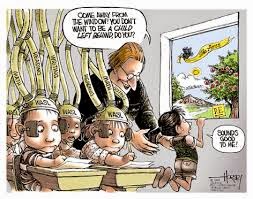By Allan Alach
I welcome suggested articles, so if you come
across a gem, email it to me at allan.alach@ihug.co.nz.
This week’s homework!
Playing Video Games Is Good For Your Brain – Here’s How
One to challenge any preconceived ideas you may
have …
“However
there is now a wealth of research which shows that video games can be put to
educational and therapeutic uses, as well as many studies which reveal how
playing video games can improve reaction times and hand-eye co-ordination. For
example, research has shown that spatial visualisation ability, such as
mentally rotating and manipulating two- and three-dimensional objects, improves
with video game playing.”
Looking ahead
Yet another article by UK academic Steve Wheeler
- you’ll be starting to
think that I have a high regard for him …
“This
quote from Swiss psychologist Jean Piaget in 1988 reveals a deep truth that all
teachers should apprehend. School is not about teaching subjects, it is about
teaching children - and education is not simply about preparing them for a
world of work, it is a preparation for life. “
Half of the Statistics in Visible Learning are wrong (Part 2)
.jpg) |
| An educational rock star? |
If there’s anyone out there who still thinks John Hattie is the ‘rock star of educational research’ (actual phrase used
in an Australian newspaper) this may disillusion you.
“Again
we are left with two options to choose from
1.
John Hattie is a genius who is doing things that even
Mathematicians don’t understand.
2.
John Hattie is a well meaning man with a Social
Sciences degree who has made a mistake in using statistical techniques he didn’t realise were unknown to Mathematicians and incorrect.
The choice is yours.”
Teaching neoliberalism: time to replace Ofsted
“Ofsted
has become a political tool of the GERM project not merely because of senior
staff links with academy chains, the recently appointed chair is a trustee of
the AET academies chain, but through its judgements on schools being used by
the DfE to force academisation of local authority schools, often against
vehement parent opposition.”
Creativity is the key to education, so why aren't we pursuing it?
“Creativity
can provide this trend with a home in education; teachers who are able to
determine their own teaching methods in response to what children want and
need. School is a notoriously divisive experience for people, with many
disengaging entirely with it. Surely if the way in which they were taught was
responsive
and creative, students will respond better to
education.”
Experiential Learning
Good article by Grant Wiggins.
▪ What are you doing?
▪ Why are you doing it?
▪ What does this help you do that’s important?
Alas, many kids do not provide adequate answers. And that’s why we need to worry about merely hands-on learning – even
as hands-on learning is vital for making abstractions come to life.”
5 Creativity Myths You Probably Believe
 “Let’s start with a fact: We are all capable of conceiving new, useful
ideas. Unfortunately our chances of doing this are hampered by a few stubborn
myths.These misconceptions cloak creativity in mystique and they foster elitism—the
idea that the potential for innovation and imagination is a rare gift enjoyed
by only a select few “creative types.” Here
we debunk five persistent myths that misrepresent the true neuroscience and
psychology of creativity.”
“Let’s start with a fact: We are all capable of conceiving new, useful
ideas. Unfortunately our chances of doing this are hampered by a few stubborn
myths.These misconceptions cloak creativity in mystique and they foster elitism—the
idea that the potential for innovation and imagination is a rare gift enjoyed
by only a select few “creative types.” Here
we debunk five persistent myths that misrepresent the true neuroscience and
psychology of creativity.”
Schools will start teaching typing instead of longhand
What’s
your opinion about this?
“Teaching
children to write is transitioning to a computer era, as traditional cursive
writing and calligraphy will not be taught at Finnish schools after the autumn
2016 and will be replaced with the study of typing skills …”
This week’s contributions from Bruce Hammonds:
What’s Our Vision for the Future of Learning?
Referred by Bruce’s colleague
Wayne Morris:
 |
| A new Vision for the future |
“The new landscape presents a significant upheaval. Inventors and
researchers are increasingly working independently outside academia, finding
collegial collaboration in the Global Learning Commons. Learners also find
themselves in the driving seat because formal education is no longer the only
game in town for those eager to learn. How colleges and universities adapt to
the customization and personalization of education will largely determine their
survival.”
Creativity – its
place in education
Following on, here’s an article
by Wayne Morris that lays out his vision for education.
“Creative students lead richer lives and, in the longer term, make a
valuable contribution to society. Surely those are reasons enough to bother.”
Noam Chomsky: Independent Thinking Comes
Through Discovery
‘"It doesn't matter what we cover, it matter what you
discover" - In an exclusive interview to WISE, Professor Noam Chomsky
speaks about the importance of interaction and participation in the classroom,
and what needs to be done to build the future of education.’
How a boy became an artist
“TED Talk: How I become an artist. Importance of art in the life of a
young boy who was inspired by two words about his drawing by a visiting author
of a picture book. The speaker worries about the lack of imagination in today’s
test orientated schools.”
Doodling: A
Teacher’s Secret Weapon for Unlocking
Learning
Another TED Talk on the importance of
doodling in school.
.jpg) “Despite centuries of teaching otherwise, researchers and thought
leaders alike are increasingly rebranding doodling as a source of creativity,
engagement, and yes, even keeping students on task. It’s something Sunni Brown, author of the book The Doodle Revolution, articulates well in her 2012 TED Talk, which
emphasizes the importance of looking at doodling as something to embrace rather
than shame.”
“Despite centuries of teaching otherwise, researchers and thought
leaders alike are increasingly rebranding doodling as a source of creativity,
engagement, and yes, even keeping students on task. It’s something Sunni Brown, author of the book The Doodle Revolution, articulates well in her 2012 TED Talk, which
emphasizes the importance of looking at doodling as something to embrace rather
than shame.”
How to tame your inner tiger parent
 |
| Tanith and her daughters |
Bruce’s comment: I
have just listened to Tanith Carey author of How to Tame Your Inner Tiger
Parent on National Radio and felt inspired to buy her book. She gave some
very sensible advice about parenting and was very critical of the test culture
in the UK –a culture we seem to be heading into. The book was inexpensive and I
wait eagerly to read it. Schools do feel pressure from parents eager to ensure
their children get ahead and ironically their children are suffering anxiety
and stress as a result. Learning is the loser.
From Bruce’s ‘oldies but goodies’ file:
Dysfunctional Schools
 Bruce’s comment: An
oldie but a goody –
is it time for teachers to face up to the idea that
schools actually harm some students / Shouldn’t the first rule of teaching be ‘to do no harm?’
Bruce’s comment: An
oldie but a goody –
is it time for teachers to face up to the idea that
schools actually harm some students / Shouldn’t the first rule of teaching be ‘to do no harm?’
“I don't think teachers like to face up to the fact that schooling
actually harms many of their students but it is clear, reading Kirsten's Olsen
book, it does. Obviously this harming is not done intentionally but it is all
too easy to blame failure on dysfunctional students.”
Self managing learners
Bruce’s comment:
Some questions to ask about your students now the end of the year draws near.
 “If students are to become 'active seekers, users and creators of
their own knowledge' then self managing skills need to be 'taught' deliberately
as an important goal of any classroom. The best way to see if students are
self-managing is when the teacher leaves the room . As Art Costa says, if you
do , on your return, 'what intelligent behaviours would you hope to see?’”
“If students are to become 'active seekers, users and creators of
their own knowledge' then self managing skills need to be 'taught' deliberately
as an important goal of any classroom. The best way to see if students are
self-managing is when the teacher leaves the room . As Art Costa says, if you
do , on your return, 'what intelligent behaviours would you hope to see?’”
What did you steal from your students
today?
 |
| What do we steal from our kids? |
Bruce’s comment:
Poem from John Edwards – what do schools steal from kids?
“I guess the real question is, what do we want our students to leave
with so they can continue their learning journey?”


.jpg)
.JPG)



.JPG)


.png)






.jpg)






.jpg)

.jpg)
.jpg)
.jpg)



.JPG)







.JPG)
.JPG)

